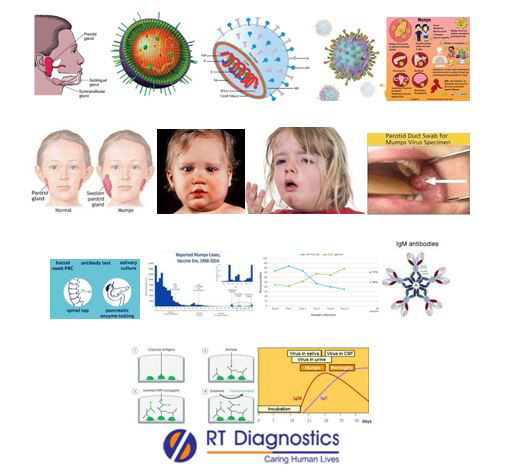Mumps - IgG:
Mumps - IgG:
Why Mumps IgG Test?
CLINICAL INFORMATION
The parotid gland is a major salivary gland in humans. The two parotid glands (the largest salivary glands) are situated on either side of the mouth and in front of the ears. It secretes serous saliva through the parotid duct into the mouth. Physiologically it facilitates the mastication and swallowing of food. Mumps virus is a RNA virus that belongs to the genus orthorubula virus and the Paramyxoviridae family. Mumps is an infectious and contagious viral disease that causes inflammation of the parotid (i.e parotitis salivary glands) that leads to swelling in the face and in adults it has a risk of causing sterility (orchitis – inflammation of the testicles due to epididymis). Mode of transmission is chiefly through infected saliva or release of tiny (respiratory or salivary secretions) droplets by coughing or sneezing if a healthy person comes in contact with it. The viral infection can also spread through sharing utensils or cups used by a person infected with mumps. The incubation period is 2 to 3 weeks. This viral infection primarily affects the salivary glands (Parotid glands situated below the ears), then causes swelling of the lymph nodes and finds access to the blood. Complications include pancreatitis, aseptic meningitis i.e meningitis is inflammation of the meninges – three layers of membranes (outer layer called dura mater, middle layer called arachnoid and the inner layer is known as pia mater) that protect the brain and the spinal cord, encephalitis (inflammation of the brain), Meningo-encephalitis, hydrocephalus, cranial nerve palsies, cerebellar ataxia, transverse myelitis, Guillain – Barre syndrome, orchitis in males (painful swelling of testicles due to epididymis) may gradually lead to testicular atrophy causing sterility, oophoritis in females (inflammation of the ovaries) may lead to infertility, mastitis in female (inflammation of the breast), hearing loss (temporary or permanent deafness) accompanied with vestibular symptoms like vertigo, repetitive and uncontrolled eye moments, heart problems (abnormal heart beats) along with myocarditis and/or pancarditis is reflected as abnormal ECG during mumps infection, nephritis, arthritis, polyneuritis, pneumonia, acalculus cholecyctitis, keratouveitis, retinitis, corneal endothelitis, thyroiditis, type-1 Diabetes mellitus, autoimmune hemolytic anemia, idiopathic thrombocytopenic purpura, hemophagocytic lymphohistiocytosis or haemophagocytic lymphohistocytosis, miscarriages (in pregnant women) etc. Clinical manifestations include swollen and painful salivary (unilateral or bilateral) gland(s) in the face leading to puffy face, glandular (high grade) fever, sialadenitis or tonsillitis (other salivary glands like submandibular and sublingual salivary glands may also get infected in rare cases), severe sore throat, pain in chewing and/or swallowing, loss of appetite, headache, muscle aches, weakness and fatigue. Most people are immune to mumps since they are vaccinated in childhood (MMR Vaccine – childhood immunization). IgG is the most common antibody present in the body during any infection. It is present in the blood and other body fluids. It protects against bacterial and viral infections. It can cross the placenta in a pregnant woman to protect her fetus. Laboratory diagnosis for confirmation of mumps is performed by antibody testing. Mumps IgG test is performed in patients suspected of a mumps viral infection. A Positive Mumps IgG test indicates prior infection to mumps virus either through immunization or due to an invading infection. Preliminary tests include a physical examination by the physician for signs and symptoms (tenderness of parotid glands), followed by additional tests such as antigen testing and/or antibody testing by ELISA, RT-PCR, imaging studies etc.

General Instructions:
Sample Requirement: Specimen - Blood sample collected from the vein. Test Preparation: None.
NOTE - Sample for specimen collections may vary based on the patient’s condition/cases according to the patient’s presenting complaints/signs or symptoms:
SPECIMEN REQUIREMENT (Special or Rare Cases) - As instructed and guided by Physician / Clinician / Pathologist / as per Laboratory’s requirements, according to procedures and protocols.
This Multi-Specialty Clinical Referral Laboratory RT DIAGNOSTICS provides precise and accurate tests with an extensive range of testing services to the medical centres to help in the diagnosis and identification of pathology in the test specimens for infectious diseases and also to evaluate the function of organ systems of the patient. It prevents further complications and helps to stabilize and restore health to near normalcy at the earliest without delay.



